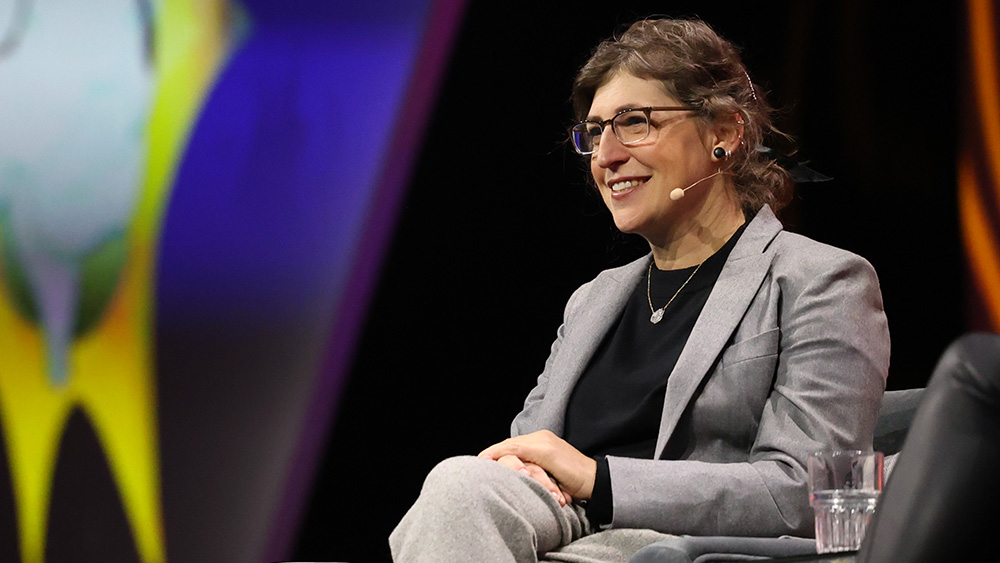
Actress and advocate Mayim Bialik speaks about mental wellness — and the importance of listening without judgment — at Convening Leaders 2024 in January. (Whatever Media Group)

Michelle Russell
Editor in Chief
When actor, neuroscientist, and mental health advocate Mayim Bialik spoke on the Convening Leaders 2024 closing Main Stage on Jan. 10 in San Diego, she shared one of the hardest things for her to do: to listen “without judgment” or giving advice — sometimes, she said, all people want is to be listened to. There’s “a language of listening” that we need to learn, Bialik said. “It’s what more of this world needs… to know how to listen and to be compassionate and to see all sides of things even if it’s not your experience.”
I was in the thick of wrapping up the January/February issue’s cover and CMP Series story on listening, so Bialik’s comments really landed with me. Several months ago, I listened to the audiobook STFU: The Power of Keeping Your Mouth Shut in an Endlessly Noisy World by Dan Lyons. One of the experts he interviewed is Sandra Bodin-Lerner, who teaches a listening course for undergrads, has a consulting practice, and is on the board of the International Listening Association (ILA).
I was intrigued, and reached out to Lyons, Bodin-Lerner, and ILA’s president, Raquel Ark, and asked them to apply their insights to the events industry — if our premise is knowledge exchange, speaking and listening should be given equal weight. Not only did they share ways to prioritize listening in event design, they talked about how honing that skill improves our personal and professional relationships.
The first step to better listening is simply to talk less, the focus of Lyons’ book. For most of us, that’s really hard. I’m guilty of frequently interrupting others. My enthusiasm to add on to what was just said — before I forget my thought — gets the better of me. Bodin-Lerner gave me a simple fix for that: Just jot my thought down and wait for the other person to finish. For others, the barrier to listening is self-talk. One corporate client who came to her because she wanted to become a more effective speaker actually had a listening — not a communicating — problem, Bodin-Lerner said. During meetings, she was so preoccupied by what she was going to say when it was her turn to speak that she wasn’t listening to her colleagues. She just needed to calm her mind.
The talk less rule also means we should get comfortable with silence — one study Lyon cites in the book found it takes only four seconds for gaps in a conversation to feel awkward. But mastering the art of the conversational pause can be a powerful tool. Let the silence hang when negotiating with a supplier or in a job interview, he advises, instead of sabotaging yourself by filling in the gap. An example from the book: “The recruiter makes an offer and then goes silent. The job seeker is disappointed in the offer, but then, getting nervous because of the silence, starts… doing the recruiter’s job, listing all the reasons they should accept the low offer.”
As Lyons puts it, we should all learn to “non-talk [our] way into happiness.”
Taming the ‘Advice Monster’
Sandra Bodin-Lerner’s biggest listening challenge, she told me, is to avoid going into advice mode. It’s what coaching guru Michael Bungay Stanier — a Convening EMEA 2024 keynoter — calls the “Advice Monster.”
Stanier, whom Deputy Editor Barbara Palmer interviewed for our cover story, said we have a tendency to “go straight to, ‘I know what the problem is and I have some opinions.’”
Stanier said it’s because we’re trained in school to think that our value is determined by the quality of our answers. “It’s no wonder,” he said, that when you get out of school, you think that “when you’re the person giving the answers, we have more status and control, and we feel we’re more important.”
But Dan Lyons said it’s those of us who know how to stay silent who really have the power.
Michelle Russell is editor in chief of Convene.
